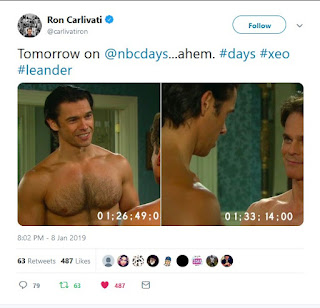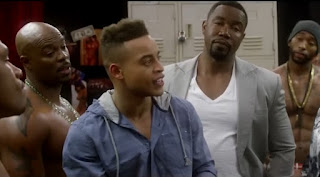Movie Review - Ghost in the Shell (2017)
There's nothing new or interesting that this remake of a Japanese animé has to say about humanity or Hollywood's obsession over androids. Fritz Lang's Metropolis was more a social critique of classism and the struggle between the wealthy and the working poor. This movie has nothing like that. It could be commenting on human trafficking and inherent racism, but that might be an afterthought to the typical issues of identity and individualism that every movie about androids has.
Scarlett Johansson (The Avengers and Lucy) stars as Major, an android that is the result of a human brain being placed in a robotic body. She works for a government organization that runs a task force investigating certain crimes. At first, it seems like it could simply be a female version of RoboCop (2014) and the way it progresses RoboCop is essentially what it is, but there is an added layer to it, which the filmmakers may or may not have anticipated.
When it was announced a year or so ago that Johansson was cast in this film, there was a backlash because many saw it as another case of Hollywood whitewashing, another case of hiring a white person to play a role that was originally established to be a person of color, either black, Latino or in this example Asian. This movie is a remake of a Japanese animé, based on a Japanese manga, so many felt a Japanese or Asian-American actor should have been hired to play the role.
In general, I would agree, but casting a white person here actually makes more sense than in recent egregious examples like The Last Airbender (2010) or Exodus: Gods and Kings (2014). The reason it makes more sense has to do with the story having a parallel to Jordan Peele's Get Out released last month.
Spoiler alert for Get Out, but in that film, the idea is also that of human trafficking. That film had black people being harvested and at times physically kidnapped. Those stolen black people had their minds replaced, as the minds of white people were implanted in them. Critics saw this as a brilliant attack on racism among liberally minded or left-wing people.
It's revealed here that a similar thing is happening. Instead of black people, it's Asian people who are being harvested or physically kidnapped. Their Asian minds are then implanted in white android bodies. In Get Out, the black body is fetishized. Here, it's the Asian mind that's stereotypically fetishized.
In that regard, this movie is just as good an attack on racism or the idea of whitewashing as Get Out. One could argue the film is also hypocritical at the same time. While it attacks whitewashing on a narrative and thematic level, it doesn't take away that it's also guilty of that same whitewashing. There are ways that this film could have circumvent that hypocrisy.
One way is by giving more voice and light to the life that Major had prior to becoming a robot. Major can't remember her life prior for most of the film. We do meet her biological mother who is a Japanese woman. More should have been given to the mother talking about or showing her daughter Motoko. Major used to be this living, breathing, Japanese girl. We should have seen more of that girl.
It also would have helped if some of the other characters were developed or fleshed out a little, pun intended. Major is involved with a police task force. She has a partner named Batou, played by Pilou Asbaek (Ben-Hur and Lucy) and a boss named Aramaki, played by Takeshi Kitano (Battle Royale and The Blind Swordsman: Zatoichi). Besides learning Batou takes care of stray dogs and Aramaki is like a fox, a kind of stray dog, not much is learned about these people.
Juliette Binoche (The English Patient and Chocolat) is the only standout as Ouelet, a doctor and designer for the androids. She is like the mother figure for Major who cares for her physically and emotionally. She's basically Gary Oldman in RoboCop.
But, when it comes to movies about robots, there's no step forward from that 2014 film. Johansson's role in Her did more to step things forward. Ideas really haven't gone further than Star Trek: The Next Generation and its episode "The Measure of a Man." The special effects too haven't progressed or are any better than in Ex Machina or Steven Spielberg's A.I.: Artificial Intelligence.
Rated PG-13 for intense sequences of sci-fi violence, suggestive content and disturbing images.
Running Time: 1 hr. and 47 mins.
Scarlett Johansson (The Avengers and Lucy) stars as Major, an android that is the result of a human brain being placed in a robotic body. She works for a government organization that runs a task force investigating certain crimes. At first, it seems like it could simply be a female version of RoboCop (2014) and the way it progresses RoboCop is essentially what it is, but there is an added layer to it, which the filmmakers may or may not have anticipated.
When it was announced a year or so ago that Johansson was cast in this film, there was a backlash because many saw it as another case of Hollywood whitewashing, another case of hiring a white person to play a role that was originally established to be a person of color, either black, Latino or in this example Asian. This movie is a remake of a Japanese animé, based on a Japanese manga, so many felt a Japanese or Asian-American actor should have been hired to play the role.
In general, I would agree, but casting a white person here actually makes more sense than in recent egregious examples like The Last Airbender (2010) or Exodus: Gods and Kings (2014). The reason it makes more sense has to do with the story having a parallel to Jordan Peele's Get Out released last month.
Spoiler alert for Get Out, but in that film, the idea is also that of human trafficking. That film had black people being harvested and at times physically kidnapped. Those stolen black people had their minds replaced, as the minds of white people were implanted in them. Critics saw this as a brilliant attack on racism among liberally minded or left-wing people.
It's revealed here that a similar thing is happening. Instead of black people, it's Asian people who are being harvested or physically kidnapped. Their Asian minds are then implanted in white android bodies. In Get Out, the black body is fetishized. Here, it's the Asian mind that's stereotypically fetishized.
In that regard, this movie is just as good an attack on racism or the idea of whitewashing as Get Out. One could argue the film is also hypocritical at the same time. While it attacks whitewashing on a narrative and thematic level, it doesn't take away that it's also guilty of that same whitewashing. There are ways that this film could have circumvent that hypocrisy.
One way is by giving more voice and light to the life that Major had prior to becoming a robot. Major can't remember her life prior for most of the film. We do meet her biological mother who is a Japanese woman. More should have been given to the mother talking about or showing her daughter Motoko. Major used to be this living, breathing, Japanese girl. We should have seen more of that girl.
It also would have helped if some of the other characters were developed or fleshed out a little, pun intended. Major is involved with a police task force. She has a partner named Batou, played by Pilou Asbaek (Ben-Hur and Lucy) and a boss named Aramaki, played by Takeshi Kitano (Battle Royale and The Blind Swordsman: Zatoichi). Besides learning Batou takes care of stray dogs and Aramaki is like a fox, a kind of stray dog, not much is learned about these people.
Juliette Binoche (The English Patient and Chocolat) is the only standout as Ouelet, a doctor and designer for the androids. She is like the mother figure for Major who cares for her physically and emotionally. She's basically Gary Oldman in RoboCop.
But, when it comes to movies about robots, there's no step forward from that 2014 film. Johansson's role in Her did more to step things forward. Ideas really haven't gone further than Star Trek: The Next Generation and its episode "The Measure of a Man." The special effects too haven't progressed or are any better than in Ex Machina or Steven Spielberg's A.I.: Artificial Intelligence.
Rated PG-13 for intense sequences of sci-fi violence, suggestive content and disturbing images.
Running Time: 1 hr. and 47 mins.











Your Site Is WonderFull
ReplyDeleteWatch All Kind Of HD Movies Online Free
Click Here>> 123 Movies
Ghost in the
Shell (2017) Watch Online Full Movie 123 Movies